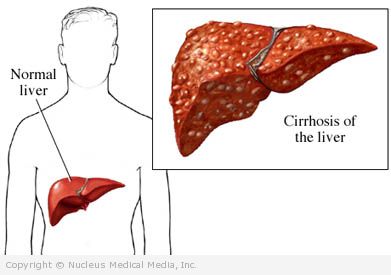Liver cancer
(Malignant Hepatoma; Hepatocellular Carcinoma; Primary Liver Cancer)
Liver cancer – Definition
The liver is located in the right side of the abdomen. It stores and metabolizes nutrients, and filters and stores blood. Liver cancer is the growth of cancer cells in the liver.
Cancer occurs when cells in the body divide without control or order. If cells keep dividing uncontrollably, a mass of tissue forms. This is called a growth or tumor. The term cancer refers to malignant tumors. They can invade nearby tissue and spread to other parts of the body.
Liver cancer – Causes
The cause of liver cancer is not known. Research shows that certain risk factors are associated with the disease.
Liver cancer – Risk Factors
Factors that may increase you chance of liver cancer include:
- Sex: male
- Age: 40 and older
- Infection with the hepatitis B virus or the hepatitis C virus
- Formation of scar tissue in the liver (called cirrhosis)
- Excessive alcohol consumption
- Malnutrition
- Obesity
- Exposure to an infectious agent, such as a liver fluke (found in southern Pacific countries)
- Hemochromatosis (abnormal collection of iron in body tissues)
- Hereditary metabolic disorders such as alpha-antitrypsin (AAT) deficiency and tyrosinemia
- Exposure to certain chemicals:
- Aflatoxin — a substance made by a fungus that often infects wheat, peanuts, soybeans, corn, and rice in tropical and subtropical regions
- Vinyl chloride and thorium dioxide — chemicals that are strictly controlled
- Anabolic steroids — male hormones sometimes given for medical reasons, but also taken by athletes to increase strength
- Arsenic — a toxic chemical
Liver cancer – Symptoms
Symptoms of liver cancer in the early stages are vague. They often go unnoticed.
Liver cancer can cause the following symptoms:
- Loss of appetite
- Unexplained weight loss
- Fever
- Fatigue
- Weakness
- Pain in abdomen
- Swollen abdomen
- Nausea
- Dark urine
- Excessive itchiness of the skin
- Confusion and increased sleepiness
- Yellowing of the skin and/or the whites of the eye
These may also be caused by other, less serious health conditions. See a doctor if you have these symptoms.
Liver cancer – Diagnosis
Your doctor will ask about your symptoms and medical history. A physical exam will be done.
Tests may include:
- Blood tests — to see how well the liver is functioning or to find substances in the blood that indicate liver cancer may be present
- X-ray — of the chest and abdomen
- Angiogram — x-rays of blood vessels
- Computed tomography (CT) scan — a type of x-ray that uses a computer to make pictures of the inside of the liver
- Magnetic resonance imaging (MRI) scan — a test that uses magnetic waves to make pictures of the inside of the liver
- Laparoscopy — a thin, lighted tube inserted through a small incision in the abdomen to look at the liver
- Biopsy — removal of a sample of liver tissue to test for cancer cells
Liver cancer – Treatment
Once liver cancer is found, staging tests are done. This will help find out if the cancer has spread and, if so, to what extent. Surgery is the only curative procedure in liver cancer. Chemotherapy and radiation therapy can reduce symptoms associated with the cancer. They are not considered curative by themselves.
- Surgery — removal of the cancerous tumor and nearby tissue, and possibly nearby lymph nodes
- Cryosurgery — destroys tumors by freezing them with a metal probe
- Ethanol ablation — kills cancer cells by injecting alcohol directly into the tumor
- Radiation therapy — the use of radiation to kill cancer cells and shrink tumors. Radiation may be:
- External radiation therapy — Radiation is directed at the liver from a source outside the body.
- Internal radiation therapy — This form places the radiation source as close as possible to the cancer cells. Radiation seeds or compounds are delivered directly to the tumor through a special catheter that is placed in hepatic artery, the vessel that delivers blood to the liver.
- Radiofrequency ablation — This involves using heat to destroy the tumor. Imaging machines are used to help the doctor guide the probe to the tumor site.
- Chemotherapy — drugs enter the bloodstream and travel through the body to kill mostly cancer cells and some healthy cells; may be given by pill, injection, and via a catheter directly into the liver
- Sorafenib (Nexavar) — a new class of therapies targeting vascular endothelial growth factor receptor (VEGF); used for advanced liver cancer, in one study improved overall survival from median 7.9 months to 10.7 months
- Biological therapy — the use of medications or substances made by the body to increase or restore the body’s natural defenses against cancer; also called biological response modifier (BRM) therapy
Liver cancer – Prevention
To reduce your risk of getting liver cancer:
- If you use needles to inject medication or drugs, always use a clean needle. Do not share needles with anyone else.
- Use condoms when having sexual intercourse if you or your partner is not in a monogamous relationship or if you don’t know if your partner has hepatitis.
- Have children vaccinated against hepatitis B.

